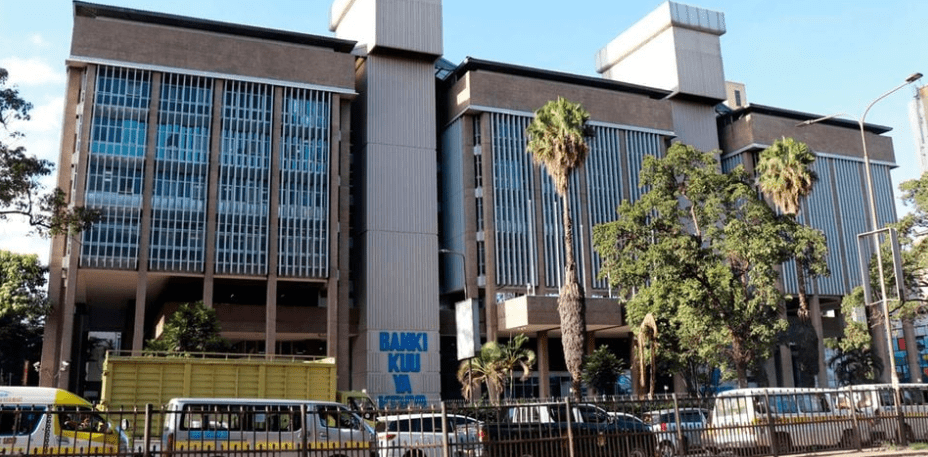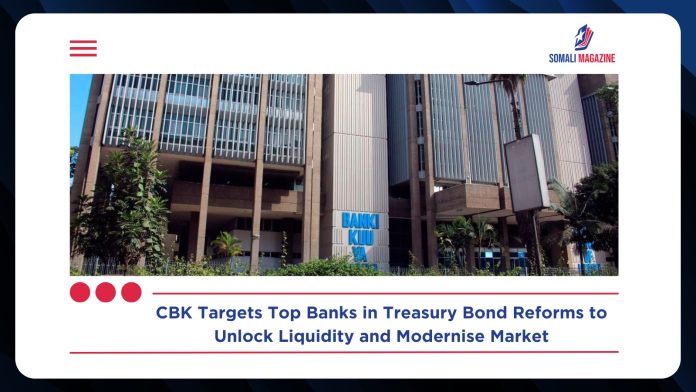Facebook Twitter (X) Instagram Somali Magazine - People's Magazine
CBK eyes top local banks for cash in treasury bond market reforms, signalling a major shift in Kenya’s domestic borrowing strategy as the Central Bank of Kenya (CBK) rolls out sweeping changes to modernise the government securities market. The reforms, anchored in the newly launched DhowCSD platform, aim to deepen market participation, enhance transparency, and unlock liquidity by leveraging the financial muscle of Kenya’s largest commercial banks.
The CBK has officially discontinued manual bid submissions and cash or cheque payments for Treasury bills and bonds, requiring all transactions to be processed electronically through the DhowCSD system. This move is expected to streamline operations and attract more institutional investors, particularly top-tier banks that hold significant volumes of government securities.
Under the new framework, banks will be able to trade Treasury bonds among themselves using a horizontal repo model, where securities are exchanged as collateral for short-term loans. This mechanism is designed to rebalance the interbank market, allowing smaller banks to access liquidity at more favourable rates by pledging their bond holdings. Previously, smaller lenders faced steep borrowing costs due to perceived risk and lack of collateral, while larger banks enjoyed unsecured lending privileges.
The reforms also pave the way for retail investors and Kenyans in the diaspora to participate more easily in government securities auctions. The CBK estimates that the DhowCSD platform could tap into over KSh 406 billion ($2.86 billion) in diaspora remittances, offering a secure and convenient channel for investment in Treasury instruments.
In its latest auction, the CBK reopened two long-term fixed-coupon bonds—FXD1/2018/020 and FXD1/2018/025—targeting KSh 50 billion to support the 2025/26 national budget. The bonds carry attractive coupon rates of 13.20% and 13.40%, respectively, and are subject to a 10% withholding tax. Investors were required to submit bids electronically by July 9, with payments due on July 14.

The Treasury’s reliance on domestic borrowing has intensified, with the 2025/26 budget projecting KSh 581.12 billion in local financing—more than double the anticipated foreign borrowing. The CBK’s reforms are therefore critical to ensuring efficient mobilisation of funds while maintaining investor confidence.
Financial analysts say the shift to electronic trading and collateralised interbank lending could transform Kenya’s fixed-income market. By enabling banks to lend against Treasury holdings, the CBK reduces its role as a lender of last resort and encourages market-driven liquidity solutions.
The reforms also promise greater pricing efficiency and transparency, with real-time data and automated settlement reducing the risk of manipulation and delays. Investors can now access detailed auction results, pricing calculators, and transaction histories through the CBK portal, empowering them to make informed decisions.
While the transition may pose initial challenges for smaller institutions and retail investors unfamiliar with digital platforms, the long-term benefits are expected to outweigh the hurdles. The CBK has pledged to provide training and support to ensure smooth onboarding and compliance.
As Kenya’s financial sector embraces digital transformation, the CBK’s treasury bond market reforms mark a bold step toward modernising public finance and fostering inclusive economic growth. With top local banks now at the centre of this evolution, the future of domestic borrowing looks more dynamic, transparent, and resilient.

